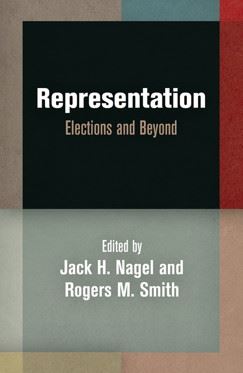Faculty Workshops
Annual Conference
Graduate Workshops
Faculty Workshops

Recent elections in the U.S. and many other constitutional democracies have shown how one of the most basic rights of full citizens, exercise of the franchise, can be frustrated, and how citizens can feel that their opinions do not count even when elections do occur. Issues of how to structure electoral systems and representative assemblies to do democratic justice to all pertinent social and economic groups and political perspectives and to achieve competent governance are answered very differently in different constitutional democracies. Mainstream and emerging media systems also play varying roles in informing, reflecting, or arguably manipulating public opinion and electoral behavior. The DCC Workshops and Spring Conference in 2008-2009 will explore the empirical, normative and policy challenges facing achievement of just, effective representation in modern electoral systems and representative bodies, with attention to the media and other sources of public opinion that shape electoral behavior. The volume for the 2008-09 year is now available here.

Are American Elections Sufficiently Democratic? A Discussion
Pamela S. Karlan (Law, Stanford University)
Dennis F. Thompson (Government, Harvard University)
Moderator: Jack Nagel (Penn Political Science)
Neither the Red States nor the Blue States but the United States: The National Popular Vote and American Political Democracy
Jamin Raskin (Washington College of Law, American University and Member, Maryland State Senate)
Discussant: Richard Beeman (Penn History)
The Right to Vote Yesterday and Today
Alex Keyssar, History (Harvard University)
Discussant: Richard Valelly (Political Science, Swarthmore College)
Citizen Representatives: Deliberative Democratic Decisionmaking in Citizens' Assemblies
Mark E. Warren (Political Science, University of British Columbia)
Discussant: Carol Gould (Philosophy and Government, Temple University)
The Principle of Affected Interests and Democratic Inclusion
Archon Fung, (Kennedy School of Government, Harvard University)
Discussant: Sigal Ben-Porath (Penn GSE)
Competition and Truth in the Market for News
Matthew Gentzkow, (Graduate School of Business, University of Chicago)
Discussant: Rogers Smith (Penn Political Science)
The Closing of the Frontier: Political Blogs, the 2008 Election, and the Online Public Sphere
Matthew Hindman (Political Science, Arizona State University)
Discussant: Joseph Turow (Annenberg School for Communication, University of Pennsylvania)
Unequal Democracy: Turnout, Minority Interests, and Local Government Spending
Zoltan L.Hajnal (Political Science, University of California, San Diego)
Discussant: Adolph Reed (Penn Political Science)
Second Annual Penn DCC Conference
May 1, 2009
PANEL 1: “What Should Elections Do?"
Chair: Tulia Falleti (Penn Political Science)
Jacob Hacker (Political Science, Yale University)
Ian Budge (Department of Government, Essex):
Discussant: Jeffrey Green (Penn Political Science)
PANEL 2: “Parties and Party Systems in Comparative Perspective”
Chair: Devesh Kapur (Penn Political Science)
Georgia Kernell (Penn DCC Postdoctoral Fellow and Northwestern University):
Pradeep Chhibber (UC Berkeley):
Discussant: Richard Valelly (Swarthmore College)
PANEL 3: “Evaluating Electoral Systems in Comparative Contexts”
Chair: Michael X. Delli Carpini (Penn)
Anthony McGann (Department of Government, Essex):
Andre Blais (Political Science, Universite de Montreal):
Discussant: Christopher Wlezien (Temple University)
PANEL 4: “The New Media and Elections"
Chair: Julia Lynch (Penn Political Science)
Michael Cornfield (George Washington University)
David Karpf (Fellow, Miller Center, UVA):
Discussant: Michael Hagen (Temple University)
Graduate Workshops

Information, Deliberation, and Oversight
C. Daniel Myers (Political Science, Princeton)
“Information Sharing and Democratic Deliberation”
Read PDF.
Meredith Wooten (Political Science, UPenn)
“Overlooked or Out of Sight? Congressional Oversight of Intelligence, 1945-2000”
Read PDF.
"Schools of Citizenship: Allegiance, Obligation and State Formation in the Confederate Army, 1861-65”
Erik Mathisen (History, UPenn):
View Abstract. Read PDF.
“Locating a Short Lived Authoritarian State in Postcolonial India”
Sourabh Singh (Sociology, Rutgers)
View Abstract. Read PDF.
"Love Stops at the Border: Marriage, Citizenship, and the Mail-Order Bride Industry”
Anne-Marie D’Aoust (Political Science, UPenn)
View Abstract. Read PDF.
Alternative Spaces of Participation and Deliberation
Andaiye Qaasim (Music, UPenn):
"Keny Arkana: Hip-Hop Activism through Cosmopolitan Routes”
View Abstract. Read PDF.
Carolyn Chernoff (GSE, UPenn):
“Towards an Urban Arts Democracy”
View Abstract. Read PDF.
"Degrees of Belonging and Graduated Rights: Immigrants and Immigration Policy in the American States”
Alexandra Filindra (Political Science, Rutgers University)
View Abstract. Read PDF.
"Deliberation, Disagreement, and Opinion Strength: Processes Underlying Mobilization to Collective Action”
Magdalena Wojcieszak (Annenberg School, UPenn)
View Abstract. Read PDF.
"Those About To Die Salute You': Sacrifice, The War In Iraq, And The Crisis Of The American Imperial Society”
Florian Olsen (Political Studies, University of Ottawa)
Discussant: Anna Foy, English Department, UPenn
View Abstract. Read PDF.
“The Tutelary Empire: State and Nation-Building in the Nineteenth Century U.S.”
Stefan Heumann (Political Science, UPenn)
Discussant: Matt Karp (History, UPenn)
View Abstract. Read PDF.

 The Andrea Mitchell Center for the Study of Democracy
The Andrea Mitchell Center for the Study of Democracy